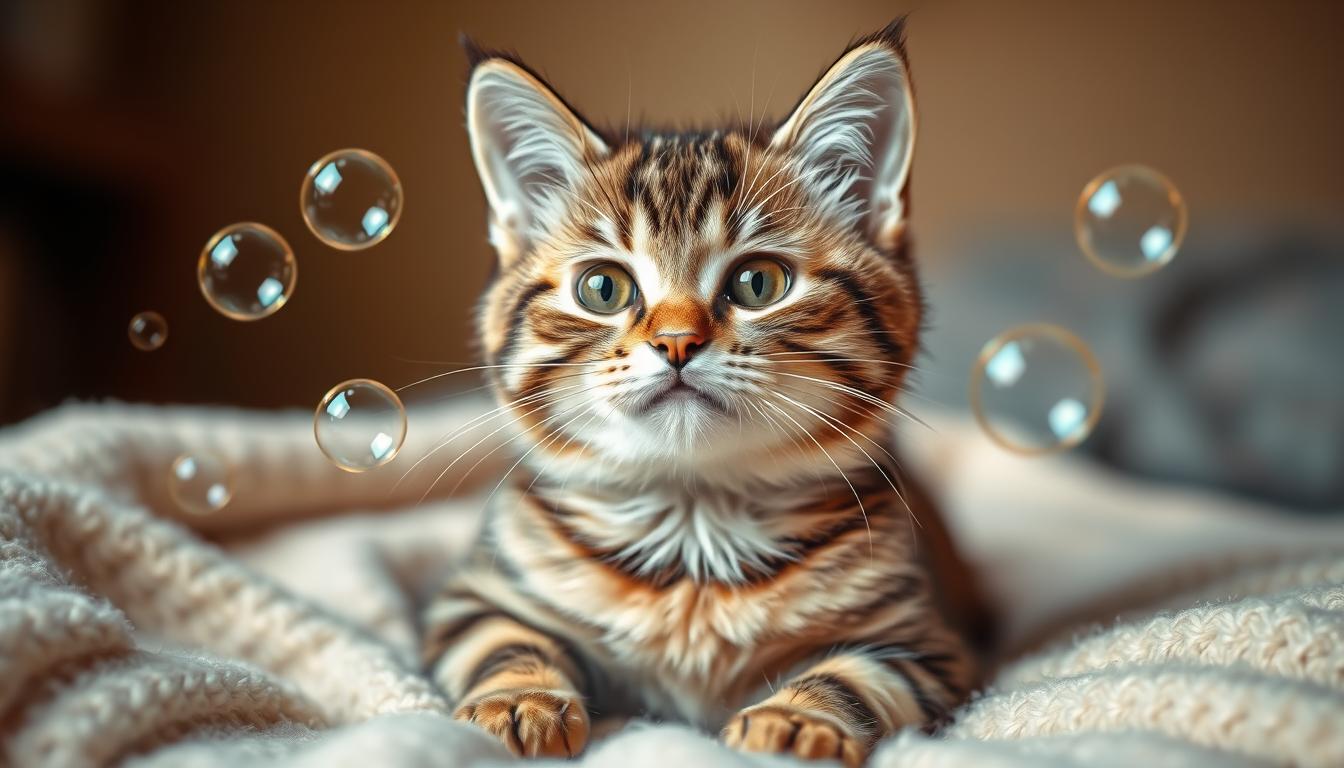Cats can get hiccups, but it’s not as common as in humans or dogs. Feline hiccups happen when the diaphragm contracts involuntarily, just like in humans. Many cat owners wonder if their pets can get hiccups, and the answer is yes.
Feline hiccups are usually not a big worry. But if they happen often or don’t stop, it might mean there’s a health issue. Knowing what causes and how to treat feline hiccups is key for cat owners. It’s important to understand this topic well.
Key Takeaways
- Cats can get hiccups, but it’s less common than in humans or dogs.
- Feline hiccups are caused by involuntary contractions of the diaphragm.
- Eating quickly or not chewing properly can cause feline hiccups.
- Frequent or persistent hiccups can be a sign of an underlying health issue.
- Understanding the causes and remedies of feline hiccups is essential for cat owners.
- Can cats get hiccups is a common question, and the answer is yes, feline hiccups are a real condition.
- Feline hiccups can be a sign of a variety of health issues, including hairballs, excessive purring, and medical problems.
Understanding Feline Hiccups: An Overview
Hiccups in cats are sudden, involuntary contractions of the diaphragm. These contractions can cause a noticeable “hic” sound as your cat breathes in. Knowing why cats hiccup helps figure out if it’s normal or a sign of something serious.
What exactly are hiccups in cats?
Hiccups in cats happen when the diaphragm spasms. This muscle is key for breathing, helping lungs expand and contract. When it gets irritated, it contracts suddenly, causing hiccups.
How common are feline hiccups?
Hiccups can happen in any cat, but kittens get them more often. Eating too fast, swallowing air, or hairballs can make hiccups more likely. While occasional hiccups are okay, if they keep happening, it’s time to see a vet.
Normal vs. concerning hiccup patterns
Normal cat hiccups usually don’t last long and happen now and then. But if hiccups go on for days or keep coming back, it might mean there’s a health problem. Watching how long and how often hiccups happen can tell you if you need to get vet help.
| Aspect | Normal Hiccups | Concerning Hiccups |
|---|---|---|
| Duration | Less than a day | More than a day |
| Frequency | Occasional | Frequent or persistent |
| Potential Causes | Eating too fast, swallowing air | Digestive or neurological issues |
| Action Required | Monitor | Consult a veterinarian |
Can Cats Get Hiccups? The Scientific Answer
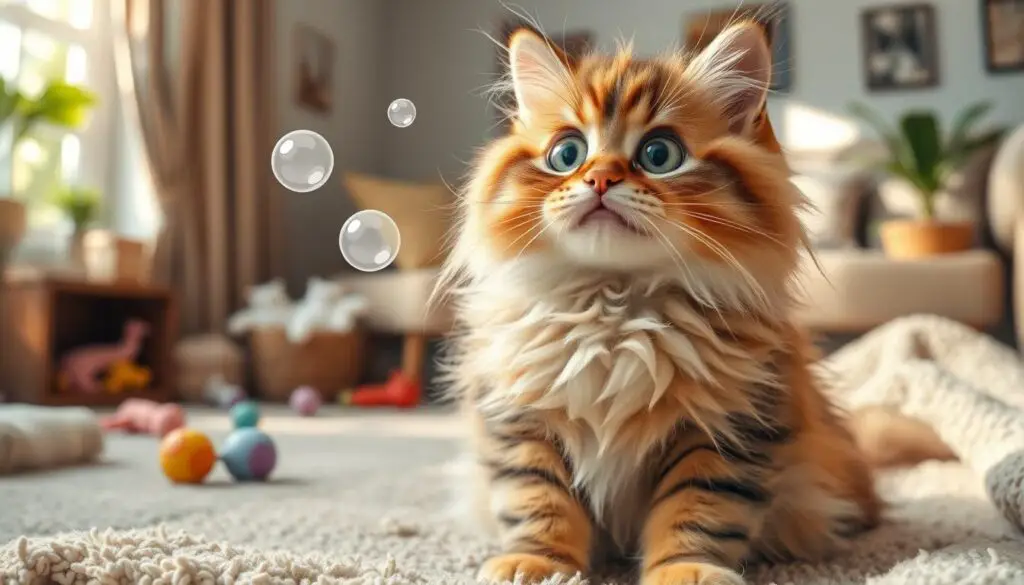
Yes, cats can get hiccups, but it’s not common. Dr. Sheldon Rubin, with 42 years of experience, rarely sees hiccups in cats. This shows hiccups in cats are not a usual thing.
Hiccups in cats come from their kitten days. They help young cats drink more milk. As cats grow up, this reflex goes away. In adult cats, hiccups usually stop on their own in a day and are not harmful.
Several things can cause feline hiccups, including:
- Eating too quickly
- Coughing up hairballs
- Sudden changes in temperature
While most cat hiccups are harmless, some health issues can look like hiccups or cause them. These include:
- Neurological disorders
- Ingestion of foreign objects
- Diaphragmatic hernias
- Asthma
The Anatomy Behind Cat Hiccups
Understanding feline hiccups means looking at a cat’s anatomy. Many parts work together to cause these spasms.
The Diaphragm’s Role
The diaphragm is key for breathing. It contracts and relaxes to let air in and out. But, during hiccups, it suddenly contracts, stopping breathing.
Nervous System Involvement
The phrenic nerve tells the diaphragm to contract. If it gets too excited, it can make cats hiccup over and over.
Respiratory Mechanics
Hiccups happen at the glottis, the throat area that lets air into the lungs. When the diaphragm contracts, the glottis quickly closes. This makes the hiccup sound.
| Anatomical Component | Function in Hiccups |
|---|---|
| Diaphragm | Involuntary contractions disrupt normal breathing patterns. |
| Phrenic Nerve | Signals the diaphragm to contract, triggering hiccups. |
| Glottis | Rapid closure during hiccups produces the sound. |
Recognizing Hiccups in Your Feline Friend
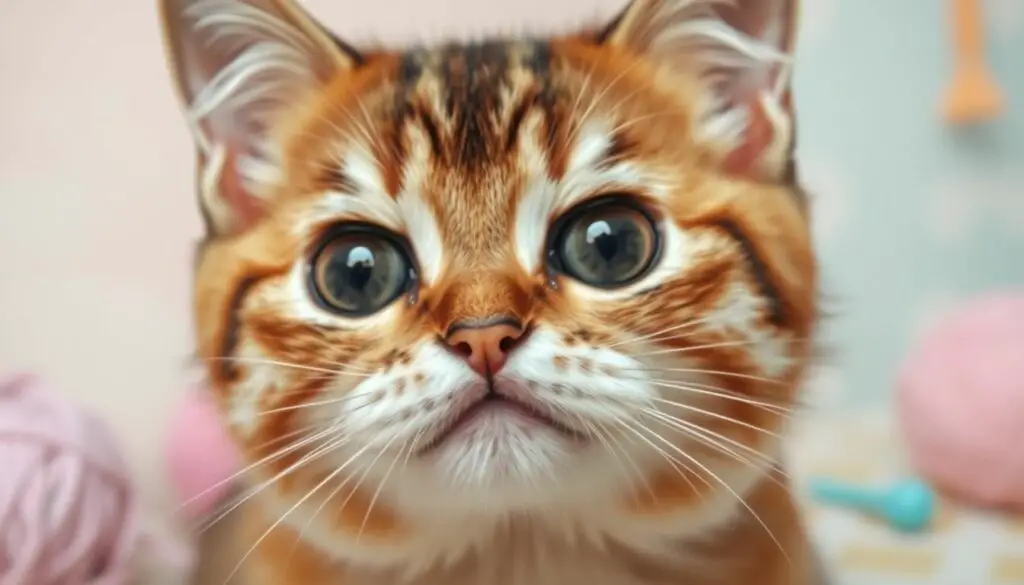
Knowing the signs of cat hiccups is key for cat owners. These hiccups show up as quick spasms in the belly or chest. You might notice them when your cat is resting or playing.
There are also sounds that come with these physical signs. You might hear a soft squeak or chirp each time your cat hiccups. This helps you tell them apart from other sounds your cat makes.
- Visible abdominal or chest spasms
- Soft squeaks or chirps
- Episodes following feeding
While it’s normal for cats to hiccup sometimes, it’s good to watch how often it happens. If your cat hiccups a lot or for a long time, it could mean there’s a health issue. You should take your cat to the vet.
| Signs of Cat Hiccups | Description |
|---|---|
| Abdominal Spasms | Quick, visible movements in the cat’s abdomen or chest. |
| Auditory Cues | Soft squeaks or chirps heard during hiccup episodes. |
| Frequency | Occasional hiccups are normal; frequent or prolonged hiccups may need attention. |
Common Triggers of Cat Hiccups
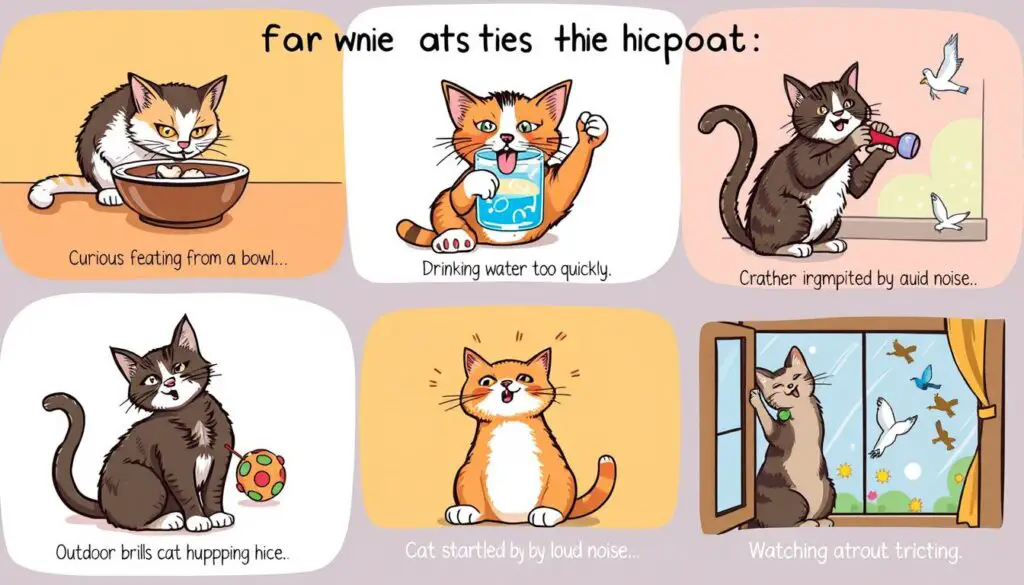
Understanding why do cats hiccup is key for pet owners. Many things can cause cat hiccups, affecting your cat’s comfort and health.
Eating Habits and Speed
Cats that eat fast may swallow too much air. This can cause spasms in the diaphragm. Also, eating too much can strain their breathing system, leading to hiccups.
Hairballs and Their Impact
Hairballs often cause hiccups in cats. When cats groom, they swallow hair. This hair can build up in their stomach and irritate the diaphragm as it moves.
Environmental Factors
Stressful places or sudden changes can upset a cat’s breathing. This can lead to hiccups. Loud noises or new places may also cause these episodes.
| Trigger | Cause | Solution |
|---|---|---|
| Eating Too Fast | Swallowing air during rapid eating | Use slow feeder bowls or divide meals into smaller portions |
| Hairballs | Accumulated hair irritating the diaphragm | Regular grooming and hairball remedies |
| Stressful Environments | Changes in surroundings affecting breathing | Create a calm and stable living space |
When Hiccups Signal Health Issues
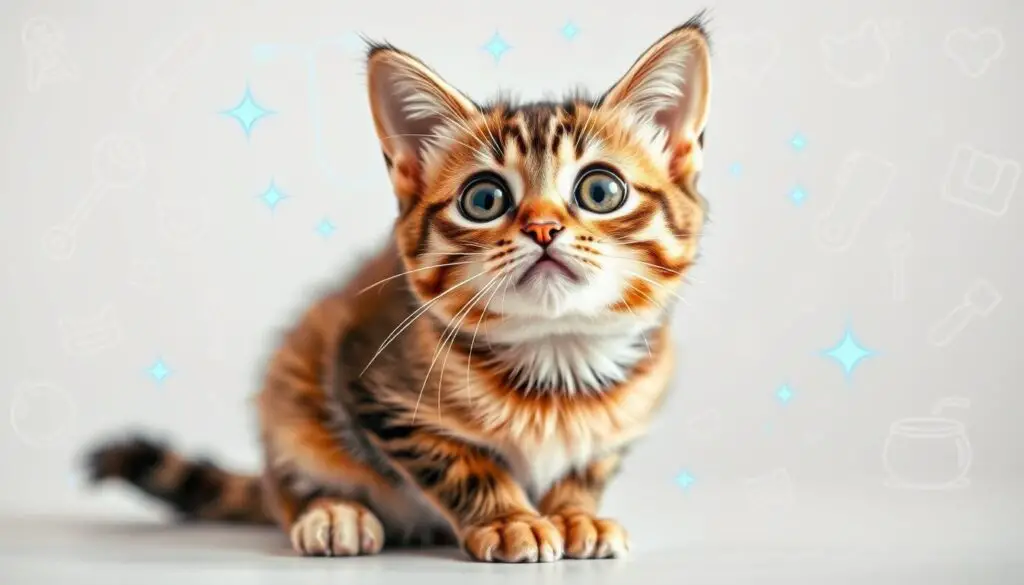
While it’s normal for cats to hiccup sometimes, frequent hiccups can mean there’s a problem. These spasms in the diaphragm might show signs of breathing issues, stomach problems, or heart disease.
Keep an eye on how often and long your cat hiccups. If hiccups last too long or happen a lot, it could be serious. Look out for other signs like coughing, trouble breathing, not wanting to eat, or feeling very tired. If your cat shows these signs with hiccups, get them to the vet right away.
Kittens often hiccup because they grow and change so fast. Make sure they eat slowly and keep their environment calm to cut down on hiccups. Regular vet visits are key to catching any cat health issues early. This keeps your cat healthy and happy.
Natural Remedies for Cat Hiccups
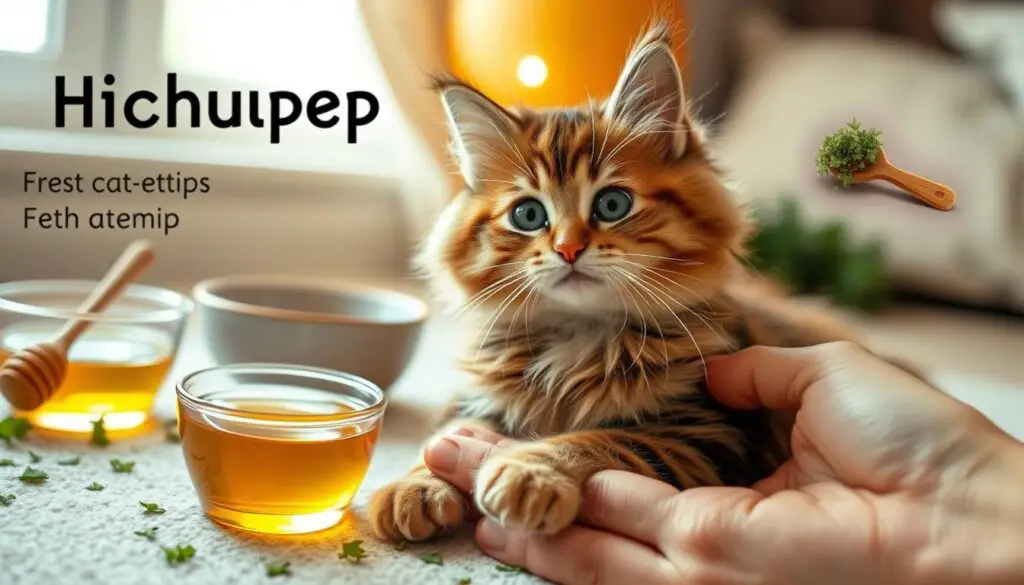
Helping your cat get rid of hiccups can be easy and effective. These remedies make sure your cat is comfortable and stress-free.
Dietary Adjustments
Changing your cat’s diet can help a lot. Use slow-feed bowls or puzzle feeders to slow down eating. This stops them from swallowing air.
Make sure your cat always has fresh water. This keeps them hydrated.
Feeding Position Modifications
How your cat eats can make a difference. Try elevating their food bowl a bit. This helps them swallow better and might stop hiccups.
Calming Techniques
Stress can cause hiccups in cats. Give them a quiet, comfy spot to relax. Gentle petting or soft music can also calm them down.
Medical Treatments and When to Seek Help
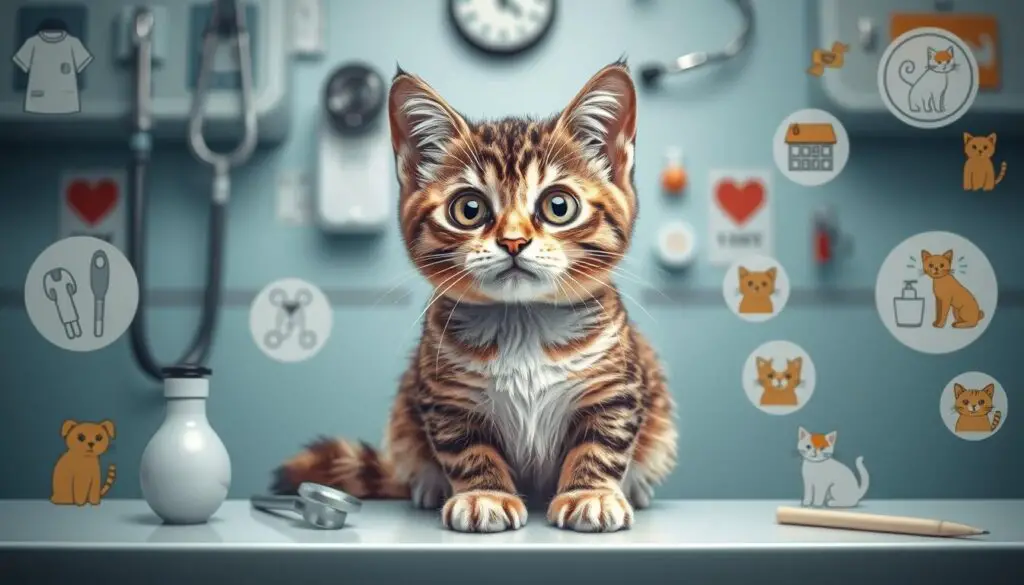
Hiccups in cats are usually not serious and go away by themselves. But, if your cat’s hiccups keep coming back, it might mean there’s a cat health issue. Watching how often your cat hiccups can help you know if you need to see a vet.
If your cat hiccups a lot or for a long time, it’s best to take them to the vet. The vet will check your cat’s health to find out what’s causing the hiccups.
Vets might give your cat different remedies for cat hiccups depending on what they find:
- They might tell you to change your cat’s diet to stop them from eating too much or too fast.
- They could give your cat medicine to treat any health problems that are causing the hiccups.
- They might also help with hairballs or parasites that could be making your cat hiccup.
In some cases, your cat might need more serious treatment. This is true if the hiccups are because of serious health problems like heart disease or breathing issues. Getting your cat the right care can help stop the hiccups and keep them healthy.
Preventing Feline Hiccups: Best Practices
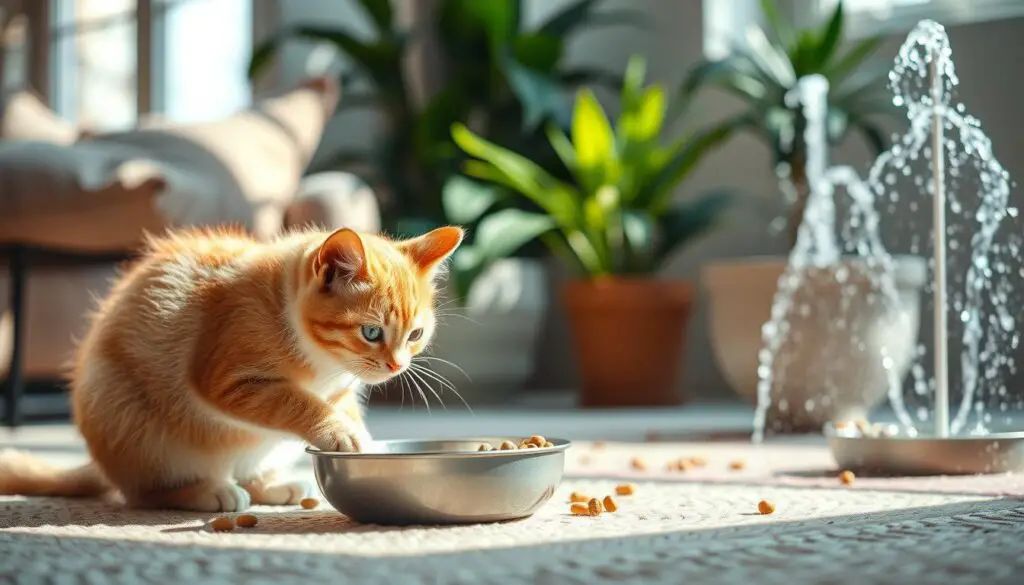
To keep your cat hiccup-free, focus on their eating habits and digestive health. These steps can help reduce hiccups and keep your cat happy.
Feeding Strategies
Make sure your cat eats slowly to avoid hiccups. Use slow-feed bowls or add a toy to their bowl. This encourages slower eating. Also, control portions and space out meals to prevent overeating, which can lead to digestive issues.
Environmental Modifications
Keep your cat’s environment stress-free to prevent hiccups. Stick to a routine and give them a quiet spot to relax. Regular grooming, like for long-haired cats, can also help by reducing hairballs.
Lifestyle Adjustments
Regular grooming helps prevent hairballs and use Laxatone for hairball elimination. Give your cat plenty of playtime and exercise. This improves their digestive health and lowers hiccup risks.
Understanding the Difference Between Hiccups and Other Symptoms
It’s important to know the signs of cat hiccups to tell them apart from other symptoms. These other symptoms might show more serious cat health issues.
Coughing vs. hiccups
Coughing and hiccups are different. They both involve sudden movements but in different ways. Hiccups in cats are when the diaphragm contracts without air coming out. Coughing, on the other hand, is when air is suddenly pushed out of the lungs.
Respiratory issues vs. hiccups
Problems like asthma or infections can seem like hiccups. But they usually have other signs too. These include wheezing, hard breathing, or constant coughing. Knowing these differences helps us deal with cat health issues quickly.
| Symptom | Hiccups | Other Respiratory Issues |
|---|---|---|
| Sound | Soft, rhythmic | Loud, harsh |
| Frequency | Intermittent and brief | Persistent and prolonged |
| Associated Actions | Minor throat contractions | Wheezing, coughing fits |
| Triggers | Eating too quickly, hairballs | Infections, asthma, allergies |
| When to Seek Help | Hiccups last longer than a day | Any signs of distress or unusual behavior |
Long-term Management Strategies
Keeping your cat healthy means regular care and attention. It’s key to tackle cat digestive problems to stop hiccups for good.
- Consistent Feeding Routine: Feed your cat at the same times each day. Use slow-feed bowls to cut down on air intake.
- Dietary Management: Pick high-quality, easy-to-digest food. This helps avoid digestive issues that can lead to hiccups.
- Regular Grooming: Brush your cat often to stop hairballs. These can irritate the lungs and cause hiccups.
- Stress Reduction: Make a peaceful space with hiding spots and fun toys. This helps reduce stress hiccups.
- Veterinary Check-ups: Regular vet visits are important. They help catch digestive problems early and keep your cat healthy.
With these steps, you can manage and stop cat hiccups. This ensures your cat lives a happier, healthier life.
Conclusion
Feline hiccups are common and usually harmless in cats. Knowing that cats can get hiccups helps pet owners understand their health better. It’s important to know when hiccups are normal and when they might be a sign of something more serious.
Things like eating too fast, grooming, and stress can cause hiccups in cats. Kittens are more likely to get hiccups because their nerves are more sensitive. Changing how you feed your cat and reducing stress can help prevent hiccups.
If your cat’s hiccups last a long time or come with other symptoms, it could be a sign of a bigger problem. Taking your cat to the vet is a good idea. By watching your cat closely and using the tips we’ve shared, you can help them stay healthy and happy.
Being a responsible pet owner means knowing about common health issues and when to get help. With this knowledge, you can take better care of your cat. This way, your cat can live a happy and hiccup-free life.
FAQ
Can cats get hiccups?
What causes hiccups in cats?
How can I recognize hiccups in my cat?
When should I be concerned about my cat’s hiccups?
What are some natural remedies for cat hiccups?
How can I prevent hiccups in my cat?
When should I seek veterinary help for my cat’s hiccups?
What is the difference between hiccups and coughs in cats?
How do hairballs contribute to hiccups in cats?
What feeding strategies can help reduce hiccups in cats?
Can environmental stressors cause hiccups in cats?
What role does the diaphragm play in feline hiccups?
Are there any specific breeds of cats that are more prone to hiccups?

Hello, this is Frank Swanson, the owner, and operator of Pet Info Hut. I created this website as a way to share my love of pets with the world. I have over 7 years of experience working with animals, and I have a passion for helping people care for their pets. I hope that you find my website useful and informative. Thanks for visiting!

